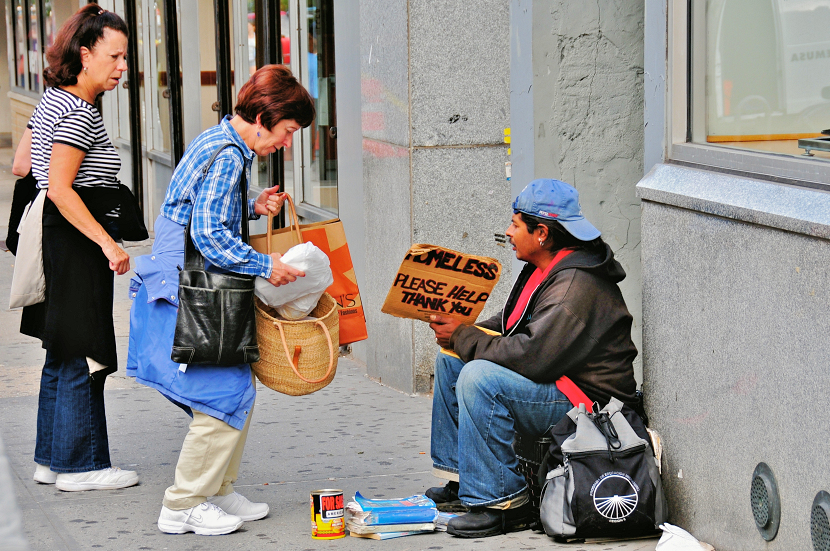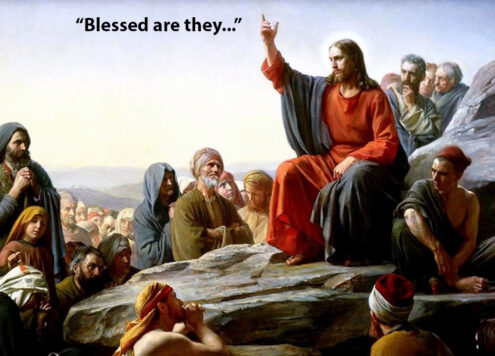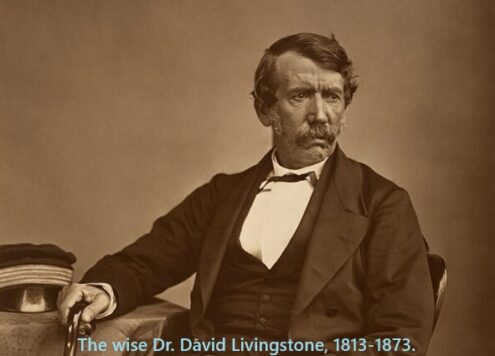When an acquaintance had a sudden nervous breakdown, disappeared from home, and was found by detectives a week later living on the underground railroad tracks of Grand Central Terminal, my perspective on life was changed irrevocably. “If it happened to him, it can happen to anyone,” a voice whispered within me. “Are you so arrogant as to think that you can remain untouched by life’s vicissitudes?” My new mantra became “there but for the grace of God go I,” and from that point forward I began to look at panhandlers and troubled souls differently, with a softer, gentler eye. Jesus said: “whatsoever you do for the least of MY people, that you do unto me.” These words now spoke to me with true fervor after the disappearance and tragic death of my acquaintance.
Working as I did in Greenwich Village I had frequent encounters with these tragic souls. One evening, I was standing outside my office building on Twelfth Street and Broadway, waiting for my husband to pick me up by car. “Please, ma’am, can you spare some change?” The voice, soft and entreating, broke into my reverie. A panhandler stood before me in tattered clothes, his manner mild, apologetic. His eyes were gentle and kind and sweet. Despite the harshness of his life, his face was luminous and radiant. There was a certain aura he emanated that made me feel safe. I knew instantly what the scriptures meant when these poor souls were described as the ” least of my people.” Surely this man belonged to that class. I dug into my pocketbook and began to pull out a dollar bill. It was nestled close to a five. I began to feel the tension of a conflict tug at my temples. I gave him the five. His mouth crinkled into a large grin, and his eyes lit up.
“Oh thank you, ma’am!” he said effusively. “You don’t know how much this means to me. I haven’t eaten a decent meal for days.”
I nodded my head in acknowledgement and he began to walk away. A minute later, he made a U-turn and wheeled back to my side. “I want to thank you again and shake your hand,” he announced magnanimously, extending his arm in an almost chivalrous way. “What’s your name?” he asked softly. I trusted this man, but for some strange reason that I still can’t fathom, I told him that my name was Alexandra. “Alexandra,” he mused. “I’ll never forget you, Alexandra. My name is James. I’m sure we’ll meet again one day.”
Two years later, deeply engrossed in my thoughts, I stepped off a curb at a busy intersection at Broadway and Forty-second Street. I had stepped right into the path of an oncoming car. “Alexandra, look out” a voice shouted in warning. Suddenly, I felt a strong hand pull me away and back up to the curb. The car whizzed by, just inches from where I had stood a second ago. I turned around to face my benefactor. It was James. I gazed at him in disbelief, thunderstruck. He, however, did not seem to share my surprise at all. “I told you we would meet again,” he smiled sweetly. He stretched out his hand once again – the hand into which I had tentatively dropped the five-dollar bill, the hand that I had shaken with such unease, the hand that had saved my life. We shook hands once again and then James disappeared into the crowd.
-Kelly McAdam
Comment:
God puts “His angels in charge of you,” (Matthew 4:6) and often sends them to watch over you in ways unimaginable. In the above story, God’s ministering Angel came to Kelly in the form of a down-and out panhandler on the streets of New York.
-Fr. Hugh Duffy











1 Comments
Robert Galligan
Thank you Father